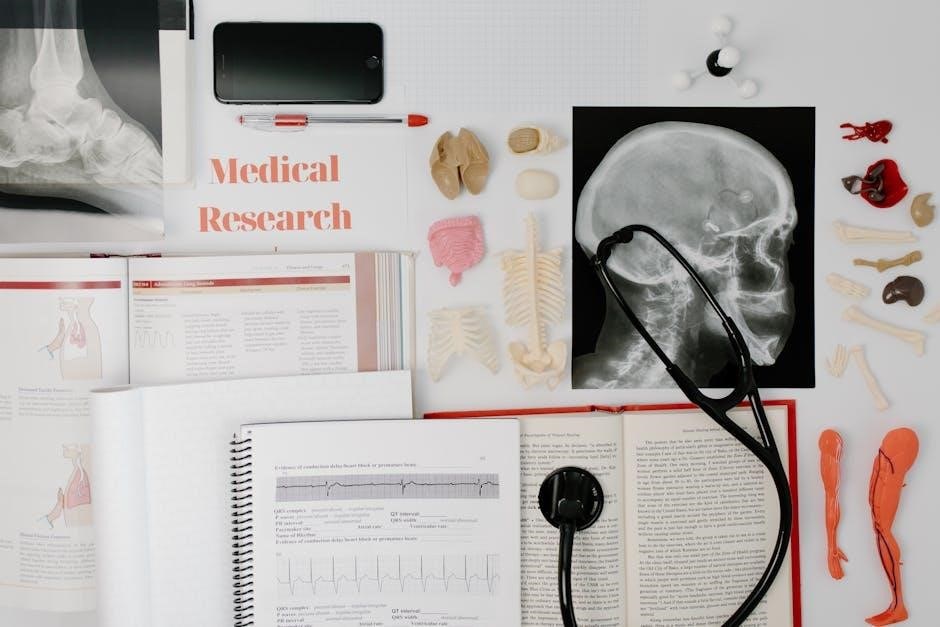nurse practitioner study guide
Nurse Practitioner certification is a crucial step for advanced practice nurses, ensuring expertise in primary and specialty care. It validates skills in patient assessment, diagnosis, and treatment, essential for delivering high-quality healthcare. Study guides and practice exams are vital resources for exam preparation, helping candidates master clinical knowledge and procedural competencies required for certification.
1.1 Overview of Nurse Practitioner Roles and Responsibilities
Nurse Practitioners (NPs) are advanced clinicians who provide primary and specialty care across diverse healthcare settings. Their roles include conducting physical exams, diagnosing illnesses, developing treatment plans, and prescribing medications. NPs emphasize preventive care, patient education, and holistic approaches to health. They often work autonomously or collaboratively with physicians, managing chronic conditions and acute issues. Staying updated on clinical guidelines and evidence-based practices is essential for their responsibilities, which also include coordinating care and advocating for patient well-being.
1.2 Importance of Certification for Nurse Practitioners
Certification for Nurse Practitioners is essential for validating expertise, ensuring safe and effective patient care. It demonstrates mastery of advanced clinical skills and knowledge, fostering trust among patients and employers. Certification also enhances career opportunities, as many healthcare organizations require it for employment. Additionally, it aligns with industry standards, promoting continuous professional development and adherence to evidence-based practices, ultimately improving patient outcomes and advancing the NP profession.
1.3 Brief History of Nurse Practitioner Certification
Nurse Practitioner certification originated in the 1960s, emerging as a response to the growing need for advanced practice nurses. The first certification programs were developed by professional organizations like the American Nurses Association (ANA) and the American Academy of Nurse Practitioners (AANP). These programs aimed to standardize competencies and validate specialized knowledge. Over time, certification expanded to include various specialties, with the ANCC and AANP establishing exams for Family, Adult-Gerontology, and Pediatric Nurse Practitioners. Today, certification remains a cornerstone of NP professionalism, ensuring evidence-based practice and patient safety.

Understanding the Certification Process
Certification involves meeting eligibility criteria, selecting a certification body, and passing a comprehensive exam. It ensures NPs demonstrate expertise in patient care, diagnostics, and treatment.
2.1 Eligibility Criteria for Nurse Practitioner Certification
To qualify for Nurse Practitioner certification, candidates must hold an advanced nursing degree, complete clinical hours, and pass a certification exam. Requirements vary by specialty but typically include a graduate degree, proof of RN licensure, and completion of supervised clinical hours. Candidates must also meet specific coursework requirements and submit application fees. Eligibility criteria ensure NPs possess the necessary education, skills, and clinical experience to provide high-quality patient care. Verifying these requirements with the certification body is essential before applying.
2.2 Choosing the Right Certification Body (AANP vs. ANCC)
Choosing between the American Academy of Nurse Practitioners (AANP) and the American Nurses Credentialing Center (ANCC) involves understanding their differences. The AANP focuses on primary and specialty care, offering a more streamlined certification process. The ANCC emphasizes academic rigor and clinical expertise. Both are respected organizations, but factors like exam content, professional goals, and state requirements should guide the decision. Candidates should review each body’s exam format, eligibility criteria, and support resources to select the best fit for their career path and professional development.
2.3 Exam Registration and Scheduling Process
Registering for the Nurse Practitioner certification exam involves creating an account with the chosen certification body, submitting required documents, and paying the exam fee. Candidates can schedule their exam online or by phone, with options to choose a date and location convenient for them. It’s important to review the certification body’s specific requirements and timelines. Once registered, candidates receive confirmation and access to study resources. Proper planning and preparation are essential to ensure a smooth exam experience and successful outcomes.
Exam Format and Content
The Nurse Practitioner certification exam includes multiple-choice questions assessing clinical knowledge, patient assessment, and diagnostic reasoning. The format varies by specialty, focusing on core competencies and evidence-based practices.
3.1 Family Nurse Practitioner (FNP) Exam Format
The Family Nurse Practitioner (FNP) exam consists of multiple-choice questions testing knowledge in primary care, pharmacology, and patient assessment. The exam typically includes 150-200 questions, with a timed format. Content focuses on health promotion, disease prevention, and management of chronic and acute conditions. Practice exams and study guides are essential for mastering the exam format, ensuring familiarity with question types and content areas. Proper preparation helps candidates navigate the exam confidently and efficiently.
3.2 Adult-Gerontology Nurse Practitioner (AGNP) Exam Content
The Adult-Gerontology Nurse Practitioner (AGNP) exam focuses on advanced care for adults and older adults, covering chronic disease management, geriatric syndromes, and palliative care. The content emphasizes pharmacology, diagnostic reasoning, and evidence-based practices. Study guides highlight key areas such as cardiovascular, respiratory, and neurological conditions. Practice questions and case studies help candidates apply knowledge effectively, ensuring they are well-prepared for the exam’s clinical scenarios and critical thinking challenges.
3.4 Pediatric Nurse Practitioner (PNP) Exam Outline
The Pediatric Nurse Practitioner (PNP) exam focuses on advanced care for infants, children, and adolescents. It covers acute and chronic conditions, developmental pediatrics, and pharmacotherapy. Study guides emphasize assessment, diagnosis, and management of pediatric-specific illnesses. The exam also includes topics like growth and development, vaccination schedules, and mental health. Practice questions and case studies help candidates apply knowledge effectively, ensuring they are well-prepared for the exam’s clinical scenarios and critical thinking challenges in pediatric care.

Recommended Study Materials
Top-rated study guides, review books, and online resources are essential for Nurse Practitioner exam success. Leading options include Leik’s FNP review book and Kaplan’s practice question banks.
4.1 Top-Rated Nurse Practitioner Study Guides
Leik’s Family Nurse Practitioner Review Book is highly recommended, offering comprehensive sections on pharmacology, pediatrics, and practice exams. Fitzgerald’s resources are also top-rated, known for their detailed explanations. Kaplan’s study guides provide structured learning plans and practice questions, while Mometrix’s materials focus on exam secrets and strategies. These guides are designed to cover all exam topics, ensuring thorough preparation. They are widely praised for their clarity, organization, and relevance to the certification exams, making them indispensable tools for NP candidates.
4.2 Best Review Books for FNP Certification
Leik’s Family Nurse Practitioner Review Book is a top choice, offering a structured approach with practice exams and detailed explanations. Fitzgerald’s resources are praised for their clarity and comprehensive coverage of exam topics. Mometrix’s FNP Study Guide provides exam secrets and strategies, while Kaplan’s materials include practice questions and progress tracking. Additional notable resources include Hollier’s Clinical Guidelines and the American Nurses Association’s Review Manual, ensuring candidates have access to diverse, high-quality study tools tailored to FNP certification success.
4.3 Online Resources and Practice Question Banks
Online resources like Kaplan’s free FNP study guide and Sarah Michelle’s comprehensive review courses offer interactive learning tools. Practice question banks such as Mometrix’s NP Exam Secrets provide targeted practice with detailed rationales. These resources often include live support, progress tracking, and updated content aligned with certification guidelines. They cater to diverse learning styles, ensuring candidates can master clinical concepts and exam formats efficiently. Such digital tools are indispensable for modern NP exam preparation, offering flexibility and accessibility for busy professionals.
Clinical Skills and Knowledge Assessment
Clinical skills assessment focuses on patient evaluation, pharmacology application, and diagnostic reasoning. Resources like Fitzgerald’s review books and Leik’s study guides provide in-depth practice, enhancing decision-making abilities.
5.1 Advanced Practice Nursing Fundamentals
Advanced Practice Nursing (APN) fundamentals are the cornerstone of nurse practitioner education. These include patient-centered care, evidence-based practice, and ethical decision-making. Study guides like those by Fitzgerald and Leik emphasize these principles, ensuring NPs master foundational skills such as conducting thorough patient assessments and implementing appropriate care plans. These resources also cover legal and professional standards, essential for safe and effective practice in various healthcare settings.
5.2 Clinical Application of Pharmacology
Clinical pharmacology is a critical component of nurse practitioner training. Study guides highlight the importance of understanding drug mechanisms, dosing, and potential interactions. Resources like Hollier’s Clinical Guidelines in Primary Care provide detailed pharmacology reviews, aiding NPs in prescribing safely and effectively. These materials emphasize evidence-based practices, ensuring NPs can apply pharmacological knowledge to optimize patient outcomes and minimize adverse effects across diverse populations and conditions.
5.3 Patient Assessment and Diagnostic Reasoning
Patient assessment and diagnostic reasoning are cornerstone skills for nurse practitioners. Study guides emphasize the importance of refining these abilities through practice exams and case studies. Resources like the Leik FNP review book provide detailed sections on patient evaluation, history-taking, and physical exams. These tools help NPs master symptom assessment, differential diagnosis, and appropriate diagnostic testing. By integrating theoretical knowledge with clinical scenarios, study materials ensure NPs can accurately identify conditions and develop effective treatment plans, improving patient outcomes and care quality.
Effective Study Strategies
Effective study strategies for nurse practitioner certification include creating personalized study plans, leveraging practice exams, and engaging in active learning techniques to retain complex clinical information efficiently.
6.1 Creating a Personalized Study Plan
A well-structured study plan is essential for nurse practitioner exam success. Tailor your plan to align with exam content, focusing on weak areas and setting realistic goals. Allocate specific times for each subject, ensuring a balance between theoretical and practical knowledge. Incorporate active learning techniques like mnemonics and flashcards to enhance retention. Regularly review and adjust the plan to stay on track, ensuring comprehensive preparation for all exam sections.
6.2 Active Learning Techniques for Retaining Information
Active learning enhances retention and understanding for nurse practitioner exam preparation. Engage in techniques like self-quizzing, group discussions, and teaching others. Use mnemonics, concept maps, and flashcards to organize information visually. Practice applying knowledge through case studies and real-world scenarios to reinforce learning. Regularly test understanding with practice exams and question banks, identifying gaps to focus on improvement. These methods promote deeper engagement and long-term retention of complex material, ensuring readiness for the certification exam.
6.3 Time Management Tips for Busy Professionals
Effective time management is essential for balancing study with professional and personal life. Create a structured schedule, prioritizing core exam topics and allocating specific times for study, review, and practice exams. Break study sessions into manageable chunks, using focused intervals to maintain productivity. Leverage downtime, such as commutes, for quick reviews. Utilize digital calendars and task management tools to stay organized and on track. Consistent, efficient study habits ensure steady progress toward certification, even with a demanding schedule.

Practice Exams and Questions
Practice exams and questions are essential for assessing readiness and identifying knowledge gaps. They simulate real test conditions, improving confidence and exam-day preparedness significantly.
7.1 Benefits of Taking Practice Exams
Taking practice exams offers numerous benefits for nurse practitioner candidates. They familiarize test-takers with the exam format and timing, reducing anxiety. Practice exams also highlight knowledge gaps, allowing focused study. Additionally, they enhance time management skills and critical thinking under pressure. Many resources, like the FNP Study Guide 2024 and Mometrix Test Preparation, provide realistic questions and rationales, helping candidates understand their strengths and areas needing improvement, thereby optimizing their preparation strategy effectively.
7.2 Analyzing Sample Questions and Rationales
Examining sample questions and their rationales is a powerful learning tool for nurse practitioner candidates. It helps identify knowledge gaps and clarifies complex topics. Detailed explanations provide insights into correct and incorrect answers, enhancing understanding. Resources like the Leik FNP Review Book and Kaplan’s FNP Study Guide offer extensive question banks with rationales, enabling candidates to grasp exam content and improve problem-solving skills effectively, ensuring better preparedness for certification exams.
7.3 Using Question Banks for Targeted Practice
Question banks are essential tools for targeted practice, allowing nurse practitioners to focus on specific areas of weakness. Resources like Kaplan’s FNP Study Guide and Fitzgerald Health Education Associates offer extensive question banks with detailed explanations. These banks simulate real exam conditions, helping candidates improve time management and critical thinking. By repeatedly practicing with relevant questions, NP candidates can master complex topics and build confidence in their clinical decision-making abilities, ensuring a strong performance on certification exams.

Professional Development and Networking
Professional development and networking are crucial for nurse practitioners, offering access to review courses, workshops, and support networks. These resources enhance exam preparation and career growth.
8.1 Joining Professional Organizations
Joining professional organizations, such as the American Academy of Nurse Practitioners (AANP) and the American Nurses Credentialing Center (ANCC), provides invaluable resources for nurse practitioners. These organizations offer access to study guides, review courses, and networking opportunities, which are essential for exam preparation and professional growth. Members gain insights into certification guidelines, continuing education, and best practices, ensuring they stay updated and competitive in their field. Engaging with these groups fosters collaboration and support, aiding in both exam success and long-term career advancement.
8.2 Attending Review Courses and Workshops
Attending review courses and workshops is a highly effective way to prepare for nurse practitioner certification. These structured programs offer in-depth content reviews, practice questions, and expert insights, aligning closely with exam topics. Many courses, such as those by Kaplan and Fitzgerald Health Education Associates, provide interactive learning experiences and networking opportunities. Workshops often include hands-on activities, case studies, and tips for mastering exam formats. They complement study guides by offering live instruction, enhancing understanding and confidence for certification success.
8.3 Building a Support Network for Exam Preparation
Building a support network is essential for nurse practitioner exam preparation. Connecting with peers, mentors, and online communities fosters collaborative learning and resource sharing. Many candidates join professional organizations or online forums to exchange study tips and materials. A strong support network provides emotional encouragement and practical advice, helping candidates stay motivated and focused. It also offers access to diverse perspectives and experiences, enriching the preparation process and reducing isolation during intensive studying.

Financial Considerations
Budgeting for study materials, courses, and exams is crucial. Explore scholarships, free guides, and cost-effective resources to optimize your investment in nurse practitioner certification preparation.
9.1 Budgeting for Study Materials and Courses
Creating a budget for study materials and courses is essential for nurse practitioner exam preparation. Allocate funds for high-quality study guides, online resources, and review courses. Prioritize essential resources like Fitzgerald’s review books or Kaplan’s prep materials, which offer comprehensive content. Consider digital vs. printed formats to save costs. Additionally, explore subscription-based platforms for practice questions. Plan ahead to avoid overspending and ensure all necessary tools are within your budget for successful preparation.
9.2 Scholarships and Funding Opportunities
Exploring scholarships and funding opportunities can help offset the costs of study materials and courses for nurse practitioner certification. Many professional organizations, such as the American Nurses Association (ANA) and the American Association of Nurse Practitioners (AANP), offer scholarships specifically for NP students. Additionally, some review course providers offer discounts or financial aid programs. These resources can significantly reduce the financial burden of exam preparation and make high-quality study materials more accessible.
9.3 Cost-Effective Study Resources
Cost-effective study resources are essential for nurse practitioner exam preparation. Utilize free study guides like Kaplan’s FNP Exam Prep Free Trial for initial insights. Opting for used or digital versions of review books, such as Fitzgerald’s or Leik’s, can save money. Additionally, online platforms like Quizlet offer affordable flashcards and practice questions. Budget-friendly question banks and community-driven study groups further reduce costs without compromising on quality, making exam preparation accessible and efficient.
Emerging Trends in Nurse Practitioner Education
Emerging trends include telehealth integration into study guides, technology-enhanced learning tools, and updated certification guidelines for 2025, ensuring future nurse practitioners are well-prepared for modern healthcare challenges.
10.1 Integration of Telehealth in Study Guides
Telehealth integration in study guides is revolutionizing nurse practitioner education. These resources now include virtual patient simulations and remote consultation scenarios, preparing students for real-world telehealth practices. Interactive modules cover digital patient assessments, electronic health records, and telemedicine protocols. Such tools enhance clinical decision-making skills and familiarity with technology, ensuring future NPs can deliver quality care in both in-person and virtual settings, aligning with the growing demand for telehealth services in modern healthcare.
10.2 Use of Technology for Enhanced Learning
Technology is transforming nurse practitioner education through interactive study guides, multimedia content, and adaptive learning platforms. These tools offer personalized learning experiences, allowing students to track progress and focus on weak areas. Virtual simulations and 3D anatomy models enhance understanding of complex clinical concepts. Additionally, mobile apps and online question banks provide convenient access to study materials, enabling flexible learning and improved retention of critical knowledge and skills necessary for certification and practice.
10.3 Updates in Certification Guidelines for 2025
The 2025 certification guidelines introduce updated competencies and content areas, reflecting current healthcare trends and patient needs. Emphasis is placed on telehealth integration, expanded pharmacology scope, and advanced diagnostic reasoning. Study guides now incorporate these updates, ensuring candidates are well-prepared for exams. The guidelines also highlight the importance of evidence-based practice and cultural competence, essential for modern nurse practitioners. These changes ensure the certification process remains aligned with evolving healthcare standards and patient care demands.

Success Stories and Testimonials
Inspiring testimonials highlight the impact of comprehensive study guides and review courses on achieving certification success. Many practitioners attribute their exam readiness to these resources, ensuring patient care excellence.
11.1 Inspiring Stories from Certified Nurse Practitioners
Certified nurse practitioners often credit their success to comprehensive study guides and review courses. Many share stories of how structured study plans and practice exams transformed their exam preparation. These resources not only boosted their confidence but also enhanced their clinical skills, leading to successful careers in primary and specialty care. Inspiring testimonials highlight how these tools helped them achieve certification and make a lifelong impact in patient care.
Stories from certified NPs emphasize the importance of tailored resources and community support, fostering resilience and expertise in the field.
11.2 Testimonials from Top-Performing Students
Top-performing students rave about the effectiveness of nurse practitioner study guides and review courses. Many attribute their success to structured study plans, detailed practice questions, and comprehensive exam prep materials. Testimonials highlight how these resources simplified complex topics, enhanced clinical reasoning, and boosted confidence. Students praise the inclusion of real-world scenarios, visual aids, and rationales, stating they were instrumental in achieving high scores. These tools are consistently recommended for their ability to prepare candidates thoroughly for certification exams.
11.3 Lessons Learned from Experienced Practitioners
Experienced practitioners emphasize the importance of consistent study habits and early preparation when using nurse practitioner study guides. They recommend integrating active learning techniques, such as group discussions and case studies, to retain information effectively. Time management strategies, like creating a detailed study schedule, are also highlighted as crucial for success. Many stress the value of practice exams to identify weak areas and the importance of staying updated on the latest clinical guidelines and research.










Leave a Comment